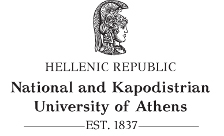Course: Economic Transformation and Development -ECO421
Course Type: Basic Elective Course
Teaching Semester: Spring (B)
Semester: 8th
Prerequisite Courses: Political Economy of Growth and Development (PEC301)
Instructor: Paraskevi Boufounou
Aims and Objectives
The course aims to highlight the dynamics and determinants of economic transformation, competitiveness and sustainable development, of the means of achieving transformation and of financing development and cyclical economy. The analysis is enriched with examples from the international, European and Greek experience. The course is divided into 4 sections.
In the first part of the course focuses on the presentation of Sustainable Developmental Transformation and on the measurement of growth. In particular, its concepts related to Sustainable Development, Sustainable Developmental Transformation and their Indicators as well as to the Sustainable Development Goals (SDGs) are presented.
The second part of the course presents the determinants of Economic Transformation. The concepts of Competitive Advantage, of the National Diamond and the catalysts associated with economic transformation are analyzed, and the relationship between finance and public policy is discussed. Finally, the characteristics and challenges of globalization associated with economic transformation are analysed.
The third part of the course presents the architecture, the actors and the Innovative Mechanisms for Financing the economic transformation and Development. (IDFMs)
Finally, the fourth section presents the strategy for successfully implementing sustainable development transformation, integrating SDGs into states’ and companies’ development strategy and to the introduction of the appropriate culture for successfully managing the change. Finally case studies are presented on the KPIs (Key Performance Indicators) development in order to meet the ESGs set.
E-class is used.
A mixed evaluation system is applied, comprising of a project/essay assignment accompanied by classroom presentation
Content:
A. Sustainable Developmental Transformation and the Measurement of Growth
1. Economic Growth, Sustainable Development and Sustainable Developmental Transformation: Conceptual Differences and Measurement
2. Sustainable Development Goals (SDGs) and Indicators
B. Determinants of Economic Transformation
3. Economic Transformation and Competitive Advantage
4. The Catalysts of Economic Transformation
5. Globalization: Characteristics, Rearrangements, Policy Challenges
6. Interdependence of Finance and Public Policy
C. Financing the Economic Transformation and Innovative Development Financing Mechanisms (IDFMs)
7. The Evolution of Financing the Economic Transformation, Cyclical Economy and Inclusive Finance
8. Development/Promotional Banks (Global-Regional-National and Revolving Financing Mechanisms)
9. Innovative Development Financing Mechanisms (IDFMs)
D. Strategies for Successfully Implementing Sustainable Development Economic Transformation
10. The Culture of Economic Transformation
11. The Management of Change
12. Sustainable Economic Transformation and SDGs (country-level)
13. Sustainable Economic Transformation and ESGs (business-level)
Bibliography
- Gillis, M. D.H.Perkins, M. Roemer and D.R.Snodgrass, 2011, Development Economics, Typothito – Dardanos Publishers, (G et.al) – (Distributed by EUDOXOS)
In e-class (as a basic manual):
European Report on Development, «Combining Finance and Policies to Implement a Transformative Post-2015 Development Agenda», (ERD 2015)
Supporting Bibliography:
- Katseli L. & H. Magoula, 2005, Macroeconomic Analysis and Greek Economy, Typothito,-Dardanos Publishers Athens (K & M)
- Petrakis, PE, 2017, Economic Growth and Growth, Quaestor Publications (PETR)
- Bourandas, D., 2015, Management: Complete Theoretical Background, Contemporary Approaches and Methods Benou Publications, Athens, (BOUR)
- Manolatos, G., 2007 International Trade, International Financing, Globalization: Theory and Practice, Hellenic Publications, (MAN)
Analytical Bibliography per section:
A. Sustainable Developmental Transformation and the Measurement of Growth
- G et al., Chapter 1, Introduction (pp. 23-44), Chapter 3, Indicators (pp. 73-81) and Chapter 4, Measuring Income Distribution, Equality and Poverty (pp. 123-141)
- K&M, Chapter 1.2 (Repetition)
- McMillan, M. and Rodrik, D., 2011, “Globalization, Structural Change and Productivity Growth”, February
Optional Data Sources
- World Economic Forum, The Global Competitiveness Report, Annual Report
- UNDP, Human Development Report, Annual Report
- World Bank, Ease of Doing Business Report & Ease of Doing Business in Greece Report, Annual Report
- World Bank, World Economic Report, Annual Report
- World Bank, World Development Indicators, Annual Report
- UNCTAD, Trade and Development Report, Annual Report
B. Determinants of Economic Transformation
- G et al., Chapter 3, Economic Growth and Structural Change (pp. 81-119) and Chapter 6, Design Models (pp. 224-242)
- Hausmann, R., Rodrik, D., Velasco A, Growth Diagnostics, 2005 in The Washington Consensus Reconsidered: Towards New Global Governance, Oxford University Press 2008b, pp.325-355
- McMillan, M. and Rodrik, D., 2011, “Globalization, Structural Change and Productivity Growth”, NBER Working Paper no 17143, June
- Porter, M., 1990, The Competitive Advantage of Nations, Mac Millan, Chapter 2 (pp.33-68), Chapter 3 (pp.69-130), Chapter 10 (pp.543-573), Chapter. 12 (617-68)
- ERD, 2015, Chapters 4,5, 7
Optionally
- Katseli, L. 2006, “Investment, Trade and International Competitiveness” in J. Dunning and K. Hamdani, edt. The New Globalism and Developing Countries, United Nations University Press
- Katseli, L., 2004, “Setting Priorities in Development Cooperation: A Short Overview of an Evolving Paradigm”, Bruno Kriesky Forum for International Dialogue
- Te Velde, 2006, “Foreign Direct Investment and Development: an Historical Perspective”, Background Paper for World Economic and Social Survey for 2006, Overseas Development Institute
- Pitelis Ch., 1998, Economic Institutions, International Competitiveness and Economic Policy, Typothito-Dardanos, Chapter 9, Productivity, Competitiveness and Convergence in the Global Economy, Chapter 10 The Relationship between Industrial and Competitive Strategy
C. Financing the Economic Transformation and Innovative Development Financing Mechanisms (IDFMs)
- Petrakis, P.E., 2017, Economic Development and Growth, Quaestor Publications, Part D International Economic Architecture and Consolidated Framework of Financial Transactions: Chapter 20 and Chapter 21, pp. 453-495)
- ERD, 2015, Chapter 3
Optionally
- Manolatos, G., 2007 International Trade, International Financing, Globalization: Theory and Practice, Ellin Publications, Chapters 11,12,13,14,15,16,17,18
D. Strategies for Successfully Implementing Sustainable Development Economic Transformation
- Bourandas, D., 2015, Management: Complete Theoretical Background, Contemporary Approaches and Methods Benou Publications, Athens, Chapters 5, 6, 8, 9, 10, 22, 23
Optionally
- Papalexandri, N. & Bourandas, D. (2016), Human Resources Management, Benou Publications, Athens, Chapters 1, 3, 5, 6, 7, 8, 11, 12, 13,14
